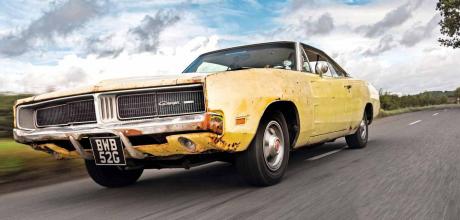1969 Dodge Charger 318 V8 ‘White Hat Special’
Dodge Charger reader bucket list drive.The 1969 Dodge Charger seemed a world way to a young Rob Squire: five decades on he’s eager to discover whether the drive lives up to its muscle car image. Words: Emma Woodcock. Photos: Jonathan Jacob.
Will a day driving a Dodge Charger satisfy one reader’s American Dream?
‘The engine sells it… the exhaust is so, so loud’
Our Dodge Charger-testing reader is entranced – and deafened – by his American Dream
The List Your dream drive made real
The garage door swings open to reveal an unrestored, factory-original 1969 Dodge Charger
White Hat Special. Its timeworn Y2 Yellow body fills the unit, spanning 208 inches from the inset quad rear lights to where Robert Squire is standing, up against the staved-in front bumper. ‘Bloody hell,’ he laughs, ‘Does this thing go?’ It does. Sympathetically returned to the road by owner Dave McSherry of Brooklyn’s Auto Services (brooklynautoservices.com), the 43,000 mile coupé drives using the vast majority of its original parts. ‘I want to capture the feeling of first driving off the Colorado Springs forecourt in June 1969,’ says Rob. Today he’ll take the wheel to discover whether the Charger lives up to his American dream.
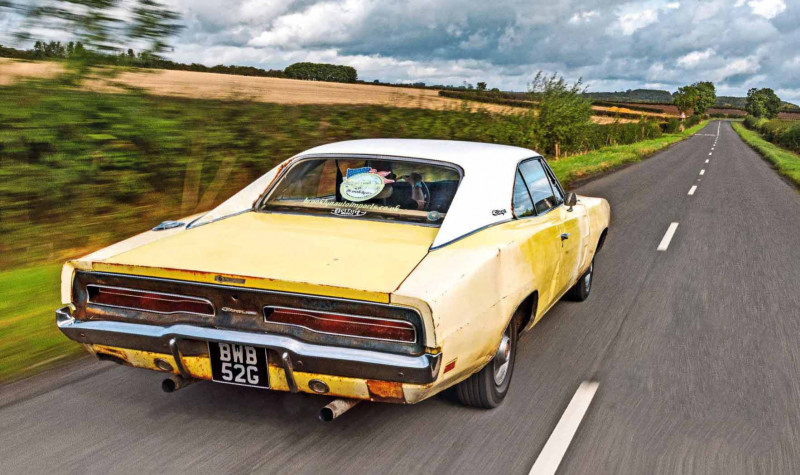
‘The B-body Dodge was an object of absolute fascination when I was growing up,’ Rob explains. ‘American cars were in the magazines I’d buy and the movies I’d see, yet they seemed so elusive here. I’ve always wanted to know what they’re like to drive and whether they were as good as people made out.’ A lifelong mechanic who has driven and worked on cars as varied as an Alfa 8C Monza, several aluminium-bodied XK Jaguars and a Facel Vega, he’ll be placing the Mopar coupé inside a wide frame of reference. He’s in good company. Dave is a hands-on American car fan, whose business specialises in importing cars from the United States. ‘The Charger is the one car I’ve always wanted,’ Dave explains. ‘I tried to exchange a Plymouth GTX for this one when I first saw it in 2012. The deal fell through but I never forgot about this Dodge.’ He finally bought the car in 2021. ‘The seller, Stephen Steele, remembered me from nine years earlier. He was heartbroken to sell it – it’s phenomenally well-preserved.’
‘I want to capture the feeling of first driving off the Colorado Springs forecourt in June 1969’
‘Now I look closer, there’s so much potential in this car,’ Rob agrees. ‘The Dodge is a righteous machine, one that’s never been mucked around. I appreciate the original steering wheel, and how Dave’s resisted the temptation to upgrade the brakes and sacrifice that originality.’ Regularly started and moved during its nine years in storage, the recently preserved Charger is in stronger health than it first appears. ‘Old automatics don’t like to sit, so I’m sure that ongoing attention has helped it. Despite the rough edges, so long as it starts and stops, I’m confident it’ll still be a good drive.’
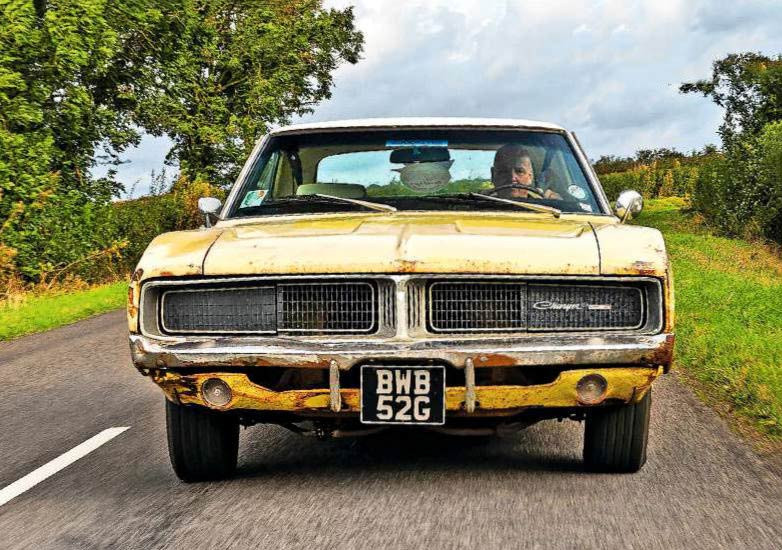
The engine thunders into life and Rob drops the car into gear, feeling the whole body sway beneath us as the torque converter takes up the slack. ‘I can’t help but smile! The Charger is so completely of its time and place – the seats are nothing like Recaros and the bodywork is as far from a modern Eurobox as you can get – which only adds to the experience.’ He laughs and laughs as he opens the throttle wide, turning the mellow V8 purr into a flat, thudding artillery of Harvey Davidson whacks.
‘I’m too busy playing with the loud pedal to even think about the handling or ride quality,’ he says. ‘A V8 thumping away under the bonnet is enough to keep any petrolhead happy, though I’ll confess to feeling a twinge of disappointment when I lifted the bonnet and saw this wasn’t a 440 R/T.’ It soon passed. ‘The 7.0-litre car will always have the ultimate cachet and mystique but a 318ci engine is still pretty big by any other standard. It goes well enough; I can barely believe a cooking pushrod has this much torque at low revs.’
A glance at the speedo needle bumps us back to reality: the Charger is no rocket ship. ‘I don’t believe the 5.0-litre really makes the claimed 230HP,’ says Rob. ‘It’s pulling the same trick as an MG Midget – it seems faster than it really is. In the same way the British roadster sits you way down on the floor to make 40mph feel like twice the speed, the Dodge has all this spectacular noise to cover the fact that it’s really no quicker than my Stag. I can describe the experience in three letters. F, U, N!’
Powering through the long curves below Rockingham Castle, Rob is growing confident behind the wheel. ‘This Dodge isn’t half as bad as it looks – it’s got accurate steering and a comfortable ride, all while feeling wonderfully different. I’ve only driven five or six miles so far, yet I already feel like I could live with the car in the real world.’ Only the brakes threaten to spoil the show, when a white van starts edging out of a side turning. ‘He’d better not pull out – that’s not a good idea! The drums don’t feel like they’d tolerate too many emergency stops...’
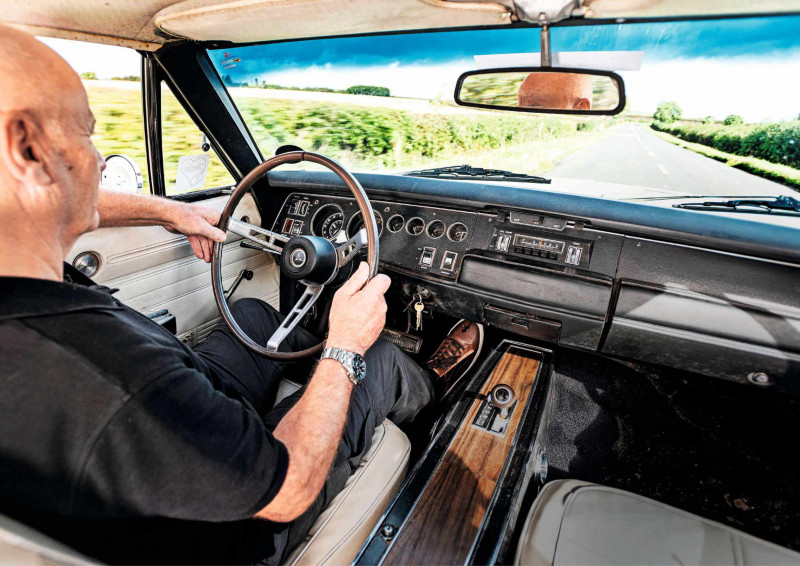
‘You can’t be a shrinking violet in this Dodge. Everyone is starting at us, which has got to be down to the combination of the engine noise, the styling and the patinated condition. I’ve seen office workers rush to the windows and builders pivot to the edge of their scaffolding just to get a closer look, and that’s only the reactions I’ve spotted!’ We pull onto a secluded gravel spit so Rob can appreciate the dramatic shape for himself. ‘It’s pure Americana and tones down the overwrought Detroit lines of the early Sixties into an impressive, attractive shape.’
‘The second-generation Charger stands alongside the Cord 812 and Corvette C2 Sting Ray as one of the very best designs ever to come out of the United States, in my opinion,’ he continues. ‘I love the front grille treatment, including the way the covers hinge up to reveal the headlights, while the rear buttresses balance out the shape, an idea Dodge employed years before the Jaguar XJ-S. The frameless windows predate the Mercedes and Jaguar installations too, and I really like how I can wind down the rear quarter windows to keep the pillarless coupé lines.’
Mechanically minded Rob can’t resist lifting the gargantuan bonnet and gazing at the original engine bay. ‘This is like looking back in time. So much of the brightwork has survived, and the engine is still running off points and a tiny original carburettor. Everything looks so simple. There’s an ocean of space in here, surrounded by metalwork of such thickness you can see the build quality. Nobody builds cars this strong any more; it’d take decades for corrosion to eat through the panels.’
Opening the long driver’s door, he heaps praise on the stylish cabin. ‘There’s very little in here I don’t like, from the joystick that operates the door mirror to the interiorcolour white door shuts. The details set it apart from what Europe was building in the same era – the time-delayed ignition light and headlamp warning buzzer are so far ahead of their time. I especially like the repeater lights mounted in the bonnet, which I’d never noticed before today.’
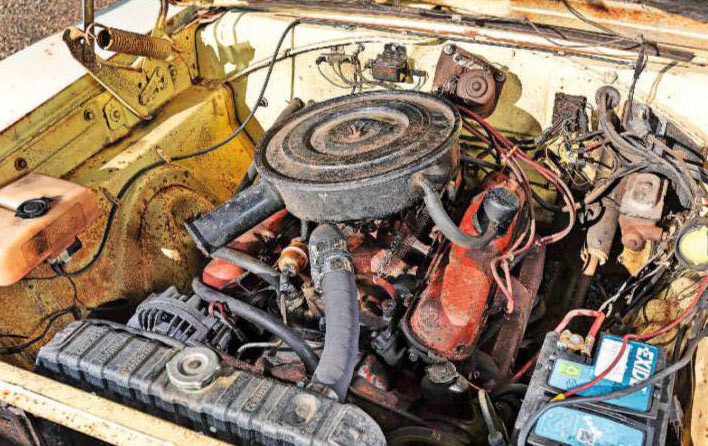
The bucket seats are another pleasant surprise. ‘I thought I’d be calling my chiropractor when I first climbed aboard. They’re massive and spongy, so offer absolutely no support, but they’re proving very comfortable and the optional leather centres give a little to hold me in place.’ As we trickle onto faster roads, Rob feels secure enough to start working the steering. ‘The wheel has so much play at a standstill but it disappears as soon as the Charger starts moving. It’s very light though, just like a Series 1 Jaguar XJ.’
‘I’m really having to concentrate, making lots of little corrections to compensate for each crest and bump. The steering wasn’t designed for B-roads but the chassis, despite its low limits, is more agile than I’d been led to believe.’ Bends toss the Charger around and Rob’s grin only gets wider. ‘The longer I spend at the wheel, the more the car is talking to me. If I muck up, I know it’ll all be my fault, and that’s the great thing about driving an analogue car. The steering and the pedals are telling me how the car will respond to my inputs as I make them. I’m really enjoying myself.’
‘I’ve got to stay mindful of the all-round drum brakes,’ he cautions. The pedal slides to the floor as we approach a tightening hairpin, making almost no difference to our speed. ‘It feels like there’s a giant spring wedged under my foot. Nothing happens when I start pushing the brakes, then suddenly the servo jumps into action, before the Charger finally decides it doesn’t want to stop after all. I’m used to bad brakes, though. The woeful leather system fitted to a Mercedes SSK is still imprinted on my mind!’ As the corners keep coming, Rob wisely starts braking earlier and earlier as the car floods with the stink of over-exerted brake linings.
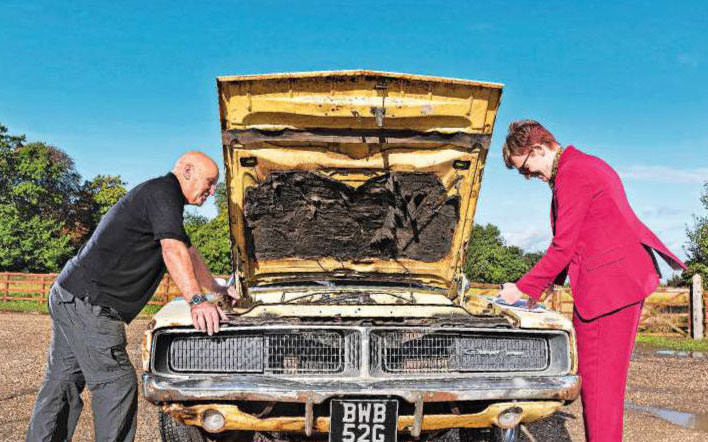
We sweep uphill and Rob holds a hesitant palm over the gearshifter, waiting to see if the three-speed TorqueFlite will downshift of its own accord. ‘This a real slushbox. It blurs the changes completely but I’m having to override it manually when I want it to kick down a gear.’ He bumps the lever back a notch and the exhaust note thumps through the cabin. ‘The car isn’t slow – I could spin a wheel out of junctions if I tried – but I can’t shake the feeling that the automatic is blunting the performance.’
‘I’m trying to get busy and the Charger won’t quite do the work,’ Rob continues as he pushes the throttle to its stop. ‘There’s initial urge when I hit the pedal but I can’t get the revs up to access peak power, which matches my experience with other American cars.’ He drops back to a steady cruise, the exhaust note falling away to a burble. ‘The Dodge is happiest as a boulevard cruiser, ambling along between 2000rpm and 2500rpm. It matches the criteria for American motoring perfectly. They’ve got such big, straight roads and I get the impression it could float steadily along them all day.’
Smooth-surfaced A-roads leads us back towards Brooklyn’s, offering a glimpse of how the Dodge might have felt in Sixties Colorado. ‘This Charger is the ultimate poseur’s car – a tourer, but a really good one. It’s so long, excessively so, the chassis needs aiming more than steering, and the brakes are a question mark. But the 5.0-litre is everything a petrolhead needs to enjoy the drive. I’ve loved getting back into a car from this era and experiencing it exactly as it would have been, which I can feel in softness of the original springs and dampers. It doesn’t need restoring, that would only turn it into a facsimile of itself.’
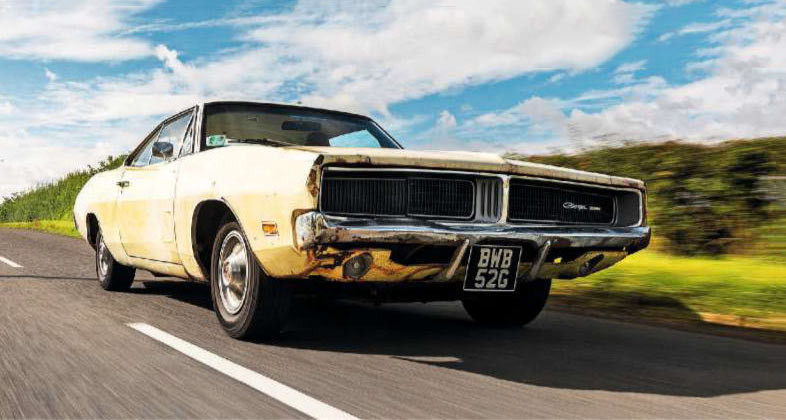
‘I started ogling Chargers as a teenager and, back then, I expected it to be a tyre-smoking, fire-breathing lairy ride. I think the 318 wants to be that car but it isn’t, and that’s okay. It’s a really enjoyable car in other ways and I’ve liked it more as I’ve learned to accommodate its quirks. I’m really grateful for the experience.’ It’s left him hungry for more. ‘The 318 has been a joy but I’d have to upgrade to a 440 R/T to keep a slot in my dream garage. The extra power must turn it into an animal!’
The Charger met Rob’s heady expectations, but he’d insist on a 440R/T for the dream garage. The Dodge Charger received a split grille for ’1969, making it appear even wider Rob isn’t entirely convinced the V8 still makes 230bhp, or if it ever did.
‘I can barely believe a cooking pushrod has this much torque at such low revs’
TECHNICAL DATA 1969 Dodge Charger 318 V8 ‘White Hat Special’
- Engine 5211cc LA V8, ohv, Carter twin-choke carburettor
- Max Power SAE gross 230bhp @ 4400rpm
- Max Torque SAE gross 340lb ft @ 2400rpm
- Steering Power-assisted recirculating ball
- Suspension Front: independent, upper wishbone, lower control arm, torsion bars, Oriflow hydraulic dampers. Rear: live axle, leaf springs, Oriflow hydraulic dampers.
- Brakes Servo-assisted, hydraulic drums all round
- Performance 0-60mph: 9sec
- Top speed: 127mph
- Weight 1622kg (3575lb)
- Fuel consumption 12mpg
- Cost new $3947 (approx. £1650 in 1969)
- Asking price £43,000
Rob is taken aback by the Charger’s unrestored state
Will the all-drum brake setup be pushed to complaint today? The driver’s seat offers Rob all the support of a bean bag – and he loves it.
ROBERT’S TOP TEN
Jaguar XK-SS
‘Fast even today: 4.2 seconds to 60mph with the right differential. Can you imagine driving one back in the Fifties?’
AC Cobra 427
‘A wild child! I’ve tried a 289 but the 7.0-litre would be a real challenge’
Jaguar E-type Lightweight
‘An amazing feat for a small Coventry manufacturer and quicker than a Ferrari 250GTO. Sublime’
Jaguar XJ13
‘With that V12 engine this would be some kind of car at full chat!’
Lotus Esprit V8
‘A proper Lotus engine with an unfair reputation – and I love the Peter Stevens styling’
Lamborghini Miura
‘The schoolboy image on the wall. Beauty second only to an E-type’
Lotus Europa
‘The big-valve John Player Special version, a car you wear and it can blow the doors off an Elan on track’
Allard J2
‘I drove one with Cherry Bombs back in the Eighties. Rev the engine and people duck. Unbelievably loud and astonishingly quick!’
Maserati Ghibli 4.7
‘Better built than a Ferrari and quick. I drove one from Farningham to Silverstone in 2.5 hours’
Dodge Charger first gen
‘Supreme, and the basis for so many fantastic muscle cars. Everything the Mustang isn’t
ROBERT SQUIRE’S CAR CV
Professional engine builder Rob has restored everything from XK120s to a Mercedes 500SS – and he’s never been afraid to get hands-on with his own cars either.
1963 FORD LOTUS CORTINA
‘I had two A-frame cars and loved both. I was working at Ian Walker back then, who taught me everything about high-performance cars.’
1973 ROVER P6 3500S
‘Tweaked up with engine parts from the USA. Very fast but I gave up after the third gearbox…’
1973 TRIUMPH TR6
‘A car to treat myself. I bought it as a rolling chassis, then got carried away adding a leather interior and building a 175bhp engine.’
1976 TRIUMPH STAG
‘Amazing, a genuine 40,000 mile car that I’ve recommissioned. You can’t replicate the way that original components feel!’
ALFA ROMEO 3.0 GTV6
‘I was trying to diagnose a suspension fault. The back stepped out, the wheels hit the loose gravel and it flipped. I certainly made up my mind to slow down after that…’


